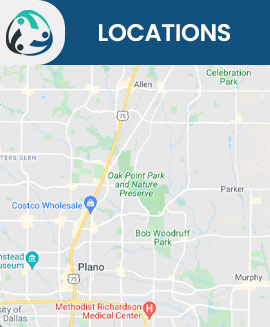Myofascial Pain Syndrome Doctor in Allen and Plano TX
The syndrome of myofascial pain is a condition that causes persistent pain and has an impact on the fascia and muscles nearby. Myofascial pain syndrome symptoms can include muscle soreness, stiffness, exhaustion, and trouble falling asleep. Physical therapy, massage, medicine, and injections into trigger points are all potential treatments for this problem. Treatment for myofascial discomfort syndrome can reduce discomfort, increase range of motion, and improve a person’s quality of life in general. An individual can have less pain, greater mobility, and increased function in daily activities by treating the underlying causes of the illness. At American Pain and Wellness, Dr. Steven L. Remer, M.D., and his team are specialized in treating myofascial pain syndrome, and other diseases. For more information, contact us or schedule an appointment online. We have convenient locations in Allen, TX, and Plano, TX.




Table of Contents:
What triggers myofascial pain syndrome?
How do you fix myofascial pain syndrome?
What does myofascial pain syndrome feel like?
Who is most likely to get myofascial pain syndrome?
Myofascial pain syndrome (MPS) is a chronic pain disorder characterized by the presence of trigger points. Trigger points are localized areas of tightness and tenderness in muscles or fascia. These trigger points can cause pain and discomfort, as well as refer pain to other parts of the body.
Myofascial pain syndrome can be triggered by a variety of factors, including:
• Muscle overuse – Repetitive movements can put a strain on the muscle fibers and result in trigger point formation.
• Poor posture – Bad posture can cause chronic muscle tension and develop trigger points.
• Trauma or injury – Muscle trauma and injuries can result in the formation of trigger points as the muscles undergo the healing process.
• Emotional stress – Chronic stress can cause muscles to tense up often. This often causes trigger points.
• Nutritional deficiencies – Low magnesium levels can increase muscle tension and contribute to the development of trigger points.
• Insufficient sleep – Lack of sleep or adequate rest can lead to tense muscles and cause myofascial pain syndrome.
• Underlying health conditions – Myofascial pain syndrome can develop due to chronic illnesses such as fibromyalgia or arthritis.
There are a variety of effective treatments to manage the symptoms of myofascial pain syndrome, improve quality of life, and enhance general well-being. The common treatments for myofascial pain syndrome include:
• Physical therapy – Physical therapy is one of the most effective ways to treat MPS. It involves a variety of exercises, stretches, massages, and other manual therapies that are designed to ease muscle tension, increase range of motion, and expedite the healing of affected tissues.
• Medication – Acetaminophen and nonsteroidal anti-inflammatory drugs (NSAIDs) are common over-the-counter painkillers used to treat MPS-related pain and inflammation. Muscle relaxants or other prescription drugs may also be suggested in certain circumstances to reduce severe muscle tension and pain.
• Trigger point injections – Injecting a local anesthetic or other pain-reducing medication right into the trigger point can reduce pain and hasten muscle healing.
• Lifestyle changes – Making adjustments to your daily habits and way of life can help reduce the symptoms of MPS. These adjustments often involve exercising frequently, utilizing stress-reduction exercises, getting enough sleep, and maintaining a healthy diet.
Myofascial pain syndrome is a chronic pain condition. Its symptoms include tightness and tenderness in the muscles or fascia. The sensation can be described as a deep, aching pain that is usually accompanied by stiffness or soreness in the affected muscles. Symptoms of myofascial pain vary in intensity and duration. The most common symptoms of myofascial pain syndrome include:
• Localized discomfort or tenderness.
• Stiffness or soreness in the muscles, especially after inactivity or overuse.
• Limited range of motion in the affected muscles and joints.
• Weakness or fatigue in the affected muscles.
• Referred pain (pain that is felt in a different area of the body than the actual source of the pain).
Overall, MPS-related pain can be persistent, and frustrating. It can affect your daily activities and quality of life. If you have symptoms of MPS, it’s crucial to see a doctor promptly, as treatment and an early diagnosis will help manage pain and prevent the onset of more serious or chronic symptoms.
Myofascial pain syndrome affects people of all ages and backgrounds. However, certain factors can increase your risk of developing MPS or make symptoms more severe. These factors include:
• Poor posture – Consistent poor posture or remaining in a fixed position for an extended period of time, such as sitting at a desk, can increase your risk of developing MPS.
• Repetitive motions – Engaging in repetitive motions or activities, such as typing, playing an instrument, or participating in certain sports, can increase your risk of MPS.
• Muscle damage – MPS trigger points can both develop due to acute muscle damage, such as strains or sprains.
• Medical history – Certain medical conditions, such as fibromyalgia, chronic fatigue syndrome, or autoimmune disorders, can increase your risk of developing MPS.
• Lifestyle factors – Stress and poor sleep can increase muscle tension and contribute to the development of MPS.
Muscle discomfort is referred to as myofascial pain syndrome (MPS). It refers to discomfort and inflammation in the soft tissues of the body. Exercises, patient education, and trigger point injection are all effective treatment options for MPS. To get the right treatment, visit us at American Pain and Wellness. For more information, contact us or schedule an appointment online. We have convenient locations in Allen, TX, and Plano, TX. We serve patients from Allen TX, Plano TX, Fairview TX, McKinney TX, Parker TX, Lucas TX, Murphy TX, Frisco TX, Richardson TX, and Collin County Texas.
Check Out Our 5 Star Reviews


Additional Services You May Need

Additional Services You May Need
• BACK AND NECK PAIN
• FACET INJECTIONS
• JOINT INJECTIONS
• PAIN MANAGEMENT
• REGENERATIVE MEDICINE
• PRP INJECTIONS
• HERNIATED DISC
• SPINE PAIN MANAGEMENT
• ARTHRITIS
• MUSCLE PAIN
• RHEUMATOLOGIC PAIN MANAGEMENT
• SACROILIAC JOINT PAIN
• NERVE PAIN
• ABDOMINAL AND PELVIC PAIN
• SPINAL STENOSIS
• SCIATICA TREATMENT
• PHYSICAL REHABILITATION THERAPY
• COMPLEX REGIONAL PAIN SYNDROME
• OSTEOARTHRITIS
• IMMEDIATE RELIEF FOR SCIATICA PAIN
• EPIDURAL STEROID INJECTIONS
• DYSTONIA
• CHRONIC PAIN
• CANCER PAIN
• AUTO ACCIDENT INJURY
• ARACHNOIDITIS




